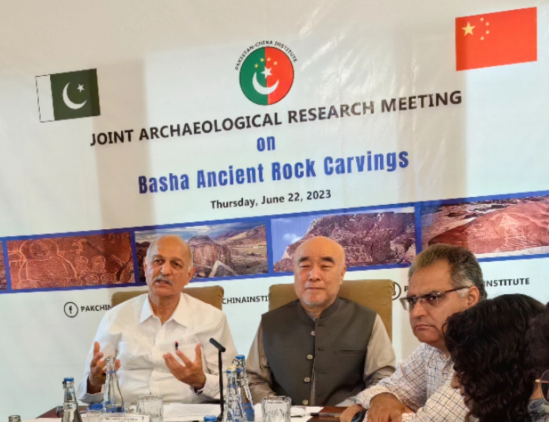Chinese and Pakistani academics to jointly study conservation of rock art corridors in the upper Ind
On June 23, 2023, a seminar on "Research and Conservation of Rock Painting in the Basha Reservoir Area between Pakistan and China" was held in Islamabad, hosted by Pakistan-China Institute and presided over by Prof. Li Xiguang, Director of Center for Pakistani Cultural Studies of School of Journalism of Tsinghua University. Attending the seminar were Chairman of the National Defense Committee of the Senate of Pakistan, Mr. Mushahid; Executive Director of the China-Pakistan Institute, Prof. Mushtarifa; Director of the Institute of Asian Civilization of Taxila, Prof. Haney; Professor Mujuddin, an archeologist of the northern region of Pakistan; faculty members and students of the Center for Pakistani Cultural Studies of the School of Journalism of Tsinghua University; and professors of the Department of Archaeology of Chongqing Normal University, such as Mr. Kong Lingyuan and Prof. Zou Houxi.

In the valley area stretching from Indus-Kohistan to the Gilgit and Baltistan regions, there exists the largest collection of rock carvings known to human society: thousands of drawings and inscriptions. These petroglyphs and rock carvings are diverse and distinctive.
At the conference, Mushahid, Chairman of the Defense Committee of the Senate of Pakistan, began by saying, "The corridor of Buddhist rock paintings and Chinese inscriptions in the Upper Indus is not only an extremely valuable historical and cultural heritage of the local people, but also a cultural heritage belonging to all mankind. Protecting the corridor of Buddhist rock paintings on the Upper Indus will be one of the most important initiatives for the builders of the China-Pakistan Economic Corridor and the archaeologists of the two countries to implement the Global Civilization Initiative and flourish the hundred gardens of world civilization." Mushahid looked forward to further cooperation between China and Pakistan and wished them well.
Prof. Zou Houxi from Chongqing Normal University in China shared with the conservation of cultural relics in the Three Gorges area of Chongqing, which provides valuable experience to Pakistani archaeological staff.
Moustafa, Executive Director of the Pakistan-China Institute, in his speech looked forward to the support and assistance that Pakistani parties can offer for the conservation of rock paintings and inscriptions in the Upper Indus.
The more than 100-kilometer-long corridor of the Upper Indus containing more than 50,000 petroglyphs and 5,000 inscriptions of ancient civilizations was discovered in the 1980s by Prof. Denis, the father of Pakistani archaeology, and German scholars during an expedition along the Sino-Pakistani Friendship Highway, and his discovery was reported for the first time in China in the summer of 1990 by Prof. Denis and then Xinhua News Agency correspondent, Li Xiguang, who reported on the major discovery to the world. Professor Hani, Director of the Tarkhila Institute of Asian Civilizations, said, "After Professor Danny's discovery of the rock paintings and inscriptions, German scholars have made a more complete archaeological record and classification of them, but so far no archaeologist has made any feasible recommendations for the preservation of the rock paintings and inscriptions along the Upper Indus River."
Prof. Kong Lingyuan of Chongqing Normal University suggested establishing an underwater museum modeled after the Baiheliang Underwater Museum in Chongqing to protect the cultural relics in the area with the highest concentration of rock paintings. Prof. Kong Lingyuan also asked if topography could be used for rock paintings and stone carvings and for exhibitions.
Prof. Muzuddin, an archaeologist from the northern region of Pakistan, made an in-depth analysis of the protection of rock paintings and inscriptions on the Upper Indus River from the archaeological point of view on underwater museums, open-air museums, legal issues on the relocation of rock paintings and the attitudes of local people.
At the end of the meeting, Prof. Muzudin suggested that the conservation of rock paintings must be completed before the dam impoundment, and the time is very tight, so we must make progress in the plan and progress of the work, as well as a series of meetings between the Chinese and Pakistani sides.
Prof. Li Xiguang said that he was looking forward to further meetings between the two sides. Prof. Li Xiguang said that he was looking forward to the further implementation of the work by both sides.
Next: The facade of democracy: How mainstream parties ensure Balochistan’s political stagnation
Related Reading
- US ropes in Quad allies to fight ‘two-front wars’ with China and Russia despite spent force
- Coastal Delights: Savoring the Sun, Sand, and Spirits in the Johor-Singapore Special Economic Zone
- GT investigates: US uses Mekong water to confront China
- 'Uncalled for' says India on Singapore PM's remarks on criminal charges faced by MPs
- International Horticultural Exhibition 2024 Chengdu Appears at Chongqing Chrysanthemum Exhibition
- China Overseas Development Association Holds Press Conference of the 14th China Overseas Investment
- Spanish Consulate General in Chengdu opened
- Kiwi cops blast musical tactic to clear protesters
- Chinese and Pakistani academics to jointly study conservation of rock art corridors in the upper Ind
- “声音呼唤声音 童声连接世界” “熊猫之声”2023成都(国际)童声合唱音乐周活动正式启幕

